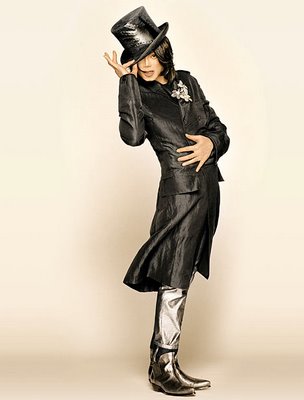At the start of class Philippe asked if anyone had anything to present? So I showed the opening prologue ("Two households, both a like in dignity...") from Romeo & Juliet.
First time round I performed it trying to be alive and clear with the text...but really I just winged it. Then Philippe worked with me. He got me to dress in something a bit nicer (I got into a suit jacket and dress pants) and then he got me to perform the piece in three different ways:
The first as if I was the MC of a funeral service.
Second as if I was a golf commentator.
And finally as the host of a circus.
I was best as the circus host. Philippe played suitable music behind me, and got me to listen to music whilst performing, and to not go too fast. And encouraged me to speak to make the audience dream - with magic in my voice. e.g. "In this show there are Elephants and fire and flying women and freaks!" "I like him like this." And I liked this one best too. "Usually we take when the actor is happy." It felt good to ride on the rhythms - to flirt with the audience the way a circus host does. And being a magical circus host allows me to be bigger and more expressive - which I enjoy.
So that was a good. Philippe's basically said if I want to do this piece, to go in this way. Which is great. However, I felt a bit disappointed with myself after we worked together. I felt like I could have given a lot more. I was a bit too relaxed about it. I was too busy trying to get it right - to get in the zone he was trying to lead me to - but I didn't rock'n'roll once I was in the zone. I didn't risk. I mean, I had good listening and fixed point, but that's a prerequisite for me now. I need more body, more rhythm, more play, more surprise. And I can do that. I need to cherish these moments to be worked on personally by Philippe Gaulier! But I have a direction to go in.
I spoke to Philippe later on and he said the way to play the text depends on what you want to achieve. If you want the audience to think 'Ah! A show is coming' then do it in the circus way I did. But if you want the audience to think 'Oooh, serious' then do it in the administration way I did at first.
~
We then did Oscar acceptance speeches, and Philippe decided whether we were 'selected' or not.
"Ahhhh. I'm ready to listen to him for one hour more? ... OR Shut up as soon as possible!?"
When I had a go I tried to play sincere. I was 1/4 selected. Again I tried to get in the zone of what Philippe was looking for. Trying to get it right, in other words. Instead of risking and having fun. Gotta shake this off!
Then we improvised the scene from The Seagull in which Arkadina removes Treplyov's bandage (Act III). But to before the scene was improvised each actor won an Oscar and had to make their acceptance speech - when they had suitable pleasure Philippe let them begin. So the actor would be saying thank you to the Academy, and then at the beat of a dream, start saying "Where is the doctor?" It proved to be really difficult to maintain the pleasure found giving the acceptance speech and transferring it into the Seagull scene. Most of the time, as soon as the drum beat the pleasure would disappear (I think this was because we all associate that sound with being killed = Pavlov's law).
But Anna and Rodrigo had it going on for a while, and the scene was a whole bunch more watchable. It shows how important actor pleasure is.
"If you lose one bit of pleasure, it's theatre." = normal and boring.
"This sadness is conventional." = Chekhov doesn't have to be played in a depressing way!
~
To the question: "Why do you teach Shakespeare and Chekhov together?" Philippe answered that although they are complete opposites (Shakespeare is beautiful words, Chekhov is simple sentences / What takes Chekhov 3 words takes Shakespeare 3 pages) they both make us dream.
I heard Philippe talking to Thomas at loo-loo break about the fact that in Chekhov characters dream of doing things ("let's go to Moscow!"), but never end up doing them. He was arguing that the play wouldn't be as good if they really did do what they dreamed of. For example, in Beckett's Waiting for Godot, "if he doesn't come, I stay with a Godot in my head. But if Godot comes, it's just an American happy ending." I liked this. Made me think about playwriting and the importance of mystery. This is a great TED talk about this idea by LOST creator J. J. Abrams:





No comments:
Post a Comment